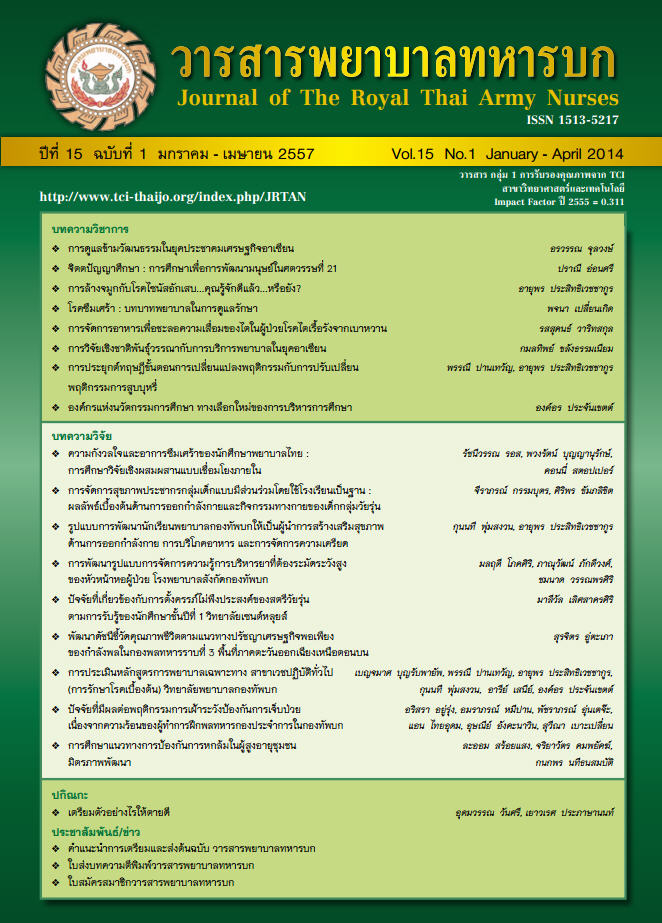รูปแบบการพัฒนานักเรียนพยาบาลกองทัพบกให้เป็นผู้นำการสร้างเสริมสุขภาพด้านการออกกำลังกาย การบริโภคอาหาร และการจัดการความเครียด Patterns in Developing Nursing Students of The RTA Nursing College to be Health Promotion Leaders in Relevance to Exercise
Keywords:
รูปแบบการพัฒนา, ผู้นำการสร้างเสริมสุขภาพ, การออกกำลังกาย, การบริโภคอาหาร, การจัดการความเครียด, นักเรียนพยาบาล, Patterns of developing, Health promotion leaders, Exercise, Food consumption, Stress management, Nursing studentsAbstract
การวิจัยครั้งนี้มีวัตถุประสงค์ เพื่อค้นหารูปแบบการพัฒนานักเรียนพยาบาลกองทัพบกให้เป็นผู้นำการสร้างเสริมสุขภาพด้านการออกกำลังกาย การบริโภคอาหาร และการจัดการความเครียด โดยใช้กระบวนการวิจัยและพัฒนาแบบมีส่วนร่วม (Participatory Action Research) กลุ่มตัวอย่างเลือกแบบเฉพาะเจาะจง (purposive sampling) คือ นักเรียนพยาบาลชั้นปีที่ 2 หลักสูตรพยาบาลศาสตรบัณฑิต จำนวน 60 คน ที่มีความสมัครใจในการเข้าร่วมโครงการ ซึ่งทุกขั้นตอนของกระบวนการวิจัยให้นักเรียนพยาบาลร่วมคิด ร่วมวิเคราะห์ ร่วมแก้ปัญหา โดยมีครูพยาบาลผู้เป็นนักวิจัยเป็นพี่เลี้ยง (Facilitator) ใช้หลักแนวคิด “สะกด สะกิด สกัด” สะกด คือ การควบคุมตนเอง (Self Regulation), การสะกิด คือ การใช้กลุ่มเพื่อนช่วยเพื่อน (Self Help Group) โดยให้เพื่อนเป็นที่พึ่งพาอาศัยกันเป็นการเสริมแรงทางสุขภาพ (Health Enabling) และการสกัด หมายถึง การที่คนในชุมชน สังคม (Society) ตระหนักรู้ถึงความสำคัญของการสร้างเสริมสุขภาพ และช่วยขจัดสิ่งเร้าที่ไม่เป็นผลดีต่อสุขภาพที่มีอยู่ในชุมชน ทำให้ได้รูปแบบการพัฒนาแกนนำนักเรียนพยาบาลกองทัพบกผู้นำการสร้างเสริมสุขภาพ 5 ข้อ ดังนี้
1. การจัดกิจกรรมเพื่อสร้างสัมพันธ์ เริ่มจากการสร้างทีมงานที่มีความเข้าใจกันฉันมิตร สร้างบรรยากาศแห่งการร่วมงานที่เอื้ออาทร ส่งผลต่อการคิดริเริ่ม และการคิดทางบวก
2. ค้นหาแกนนำสร้างเสริมสุขภาพ ต้องเกิดจากความสมัครใจ มีใจรักเข้าร่วมดำเนินกิจกรรม การพัฒนากลุ่มเพื่อให้มีความเข้มแข็ง ใช้กระบวนการการตัดสินใจแบบให้ทุกคนมีส่วนร่วม เคารพความคิดเห็นซึ่งกันและกัน
3. สานต่อการเรียนรู้ เพื่อการพัฒนาแกนนำนักเรียนพยาบาลกองทัพบกให้เป็นผู้นำการสร้างเสริมสุขภาพ ต้องเริ่มจากการสร้างนักเรียนพยาบาลให้เกิดการเรียนรู้จากการปฏิบัติจริงในชุมชน โดยจัดกิจกรรม 3 กลุ่มย่อย ดังนี้ ด้านออกกำลังกาย
จัดกิจกรรม “แอโรบิก...รำไทย” ด้านการบริโภค จัดกิจกรรม “สุขภาพดี...วันละมื้อ” และด้านการจัดการความเครียด จัดกิจกรรม “หัวเราะเพื่อสุขภาพ”
4. พัฒนาแกนนำอย่างต่อเนื่อง เน้นให้แกนนำนักเรียนพยาบาลมีส่วนร่วมในการแก้ไขปัญหา และการเผชิญปัญหาร่วมกัน เน้นกระบวนการดำเนินงาน เน้นการมีส่วนร่วมแบบเป็นหุ้นส่วน
5. ครูพี่เลี้ยงเสริมพลังเพื่อสร้างผู้นำรุ่นใหม่ โดยสนับสนุนการเรียนรู้โดยใช้เวทีประชาคมที่ใช้หลักอริยสัจ 4 เป็นเครื่องมือวิเคราะห์ปัญหา กำหนดเป้าหมายทิศทาง เสนอทางเลือก ดำเนินงานโดยมีแผนงานโครงการ และกิจกรรม รวมถึงการสรุปบทเรียนอย่างต่อเนื่อง
This research was participatory action research the objective to develop a network and to explore patterns of developing nursing students at the Royal Thai Army Nursing College to be health promotion leaders in relevance to exercise, food consumption, and stress management. The purposive sampling technique was employed to acquire sixty second-year students in the Bachelor’s Degree Program of Nursing Science. Throughout all steps of the research, nursing instructors as the researchers made them learn problems affecting their heath as well as their family and community’s. They had to work in teams to think, analyze and
solve the problems, and the researchers provided them with technical assistance and assisted them in coordinating with related local government organizations and NGOs as necessary. The results of the operations based on the principle “Sakot, Sakit and Sakat” (Restrain, Warn and Stop) are as follows. “Sakot” dealt with the nursing students’ self-regulation; “Sakit” relied on using the self help group, whereby classmates were health enabling; and “Sakat” involved the fact that community and social members realized the importance of health promotion and elimination of stimuli that had adverse impacts on health. This brought about five patterns of development of health promotion nursing students at the Royal Thai Army Nursing College, which
are as follows:
1. Creating activities for relationship building: This is the first activity of exploring patterns of development of the health promotion nursing student leaders, starting from forming teams with good mutual
understanding and creating the collaborative atmosphere to render participatory initiatives and positive thinking.
2. Finding health promotion student leaders: This is to find models for members of other networks who are accepted and trusted by people outside, which will encourage external people’s participation in the
activities.
3. Continuing learning: This is to develop the health promotion student leaders, starting from allowing them to learn things from real practice in community via three activities: “Thai Dancing Aerobic” for exercise, “Good Health: A Meal a Day” for food consumption, and “Laughing for Good Health” for stress management.
4. Developing the health promotion student leaders continually: This should be focused on their participation in problem solving and partnership.
5. Facilitators empowering the health promotion student leaders: They can support the leaders via civil society forums using “Four Noble Truths” to analyze problems, set goals, propose choices, run operations with project and activity plans, and prepare lessons learned continually.
Downloads
How to Cite
Issue
Section
License
บทความหรือข้อคิดเห็นใดใดที่ปรากฏในวารสารพยาบาลทหารบกเป็นวรรณกรรมของผู้เขียน ซึ่งบรรณาธิการหรือสมาคมพยาบาลทหารบก ไม่จำเป็นต้องเห็นด้วย
บทความที่ได้รับการตีพิมพ์เป็นลิขสิทธิ์ของวารสารพยาบาลทหารบก
The ideas and opinions expressed in the Journal of The Royal Thai Army Nurses are those of the authors and not necessarily those
of the editor or Royal Thai Army Nurses Association.





